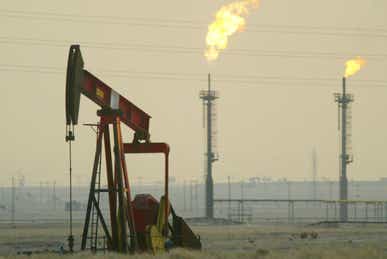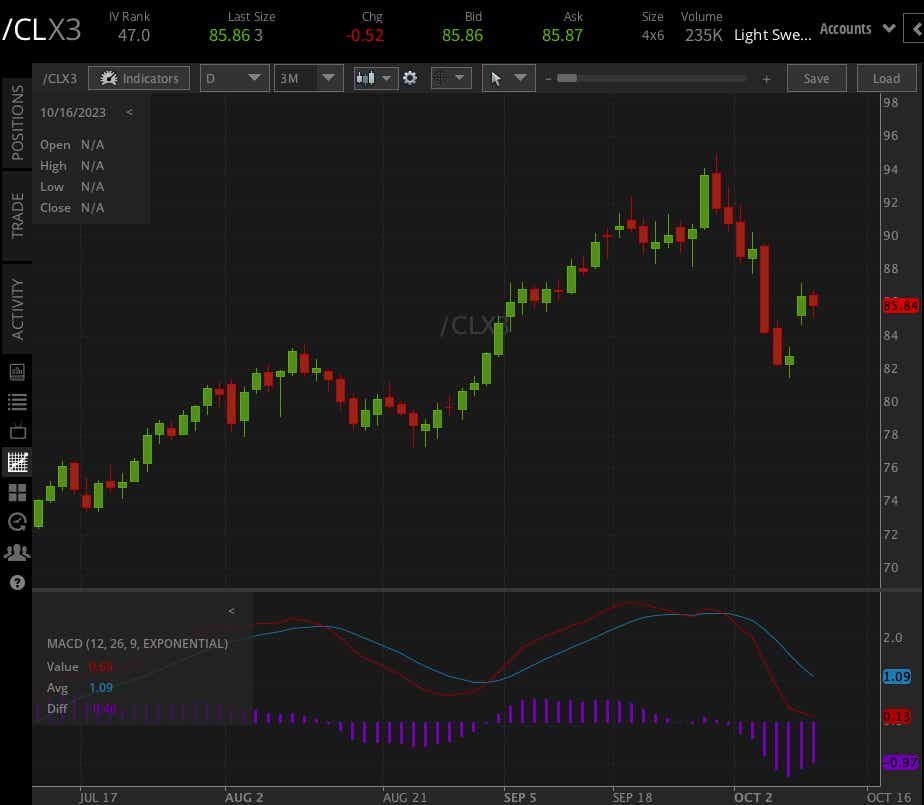Oil Markets in the Crossfire

Oil Markets in the Crossfire
Will the Israel-Hamas conflict spark price instability? Eyes on Iran.
- The Israel-Hamas conflict puts oil traders on edge.
- Are oil markets at risk from this conflict?
- Traders should keep an eye on any escalations.
Crude oil prices (/CLV3) advanced 4.34% on Monday in the first full day of trading since the militant group Hamas attacked Israel.
That marked the biggest one-day percentage gain since April. The geopolitical risks now being injected into the market are underpinned by an already tight supply situation amid supply constraints and a resilient global economy.

How could the conflict affect oil prices?
In 1973, Arab countries, led by Saudi Arabia, placed an oil embargo on certain countries that supported Israel in the Yom Kippur War. That sent oil prices surging nearly 300% and was a big shock to the global economy.
The world energy market is a different place today, though, and as of now it doesn’t look like we will repeat a story like what happened nearly 60 years ago. Even if there was appetite to use oil as a weapon among some Arab countries, it wouldn’t wield the same consequences, as the U.S. is much more energy independent now.
Besides for the initial geopolitical risk premium, the Israel-Hamas conflict doesn’t look like it will have a notable impact on the supply-demand balance or inventory of oil, which is the two primary price drivers for the commodity.
Iran is a wild card
Iran represents a big wild card to global energy markets. Supply is already tight amid ongoing OPEC+ production cuts and a resilient U.S. economy. And while Iran’s oil exports have been heavily sanctioned by the U.S., the country has still managed to push its oil out to the global markets as Washington turns a blind eye.
Currently, however, a U.S. carrier strike group is set to arrive in the Eastern Mediterranean on Tuesday. It serves as a strong message of support from Washington to Jerusalem, and as a deterrent to those who are thinking of intervening in support of Hamas.
A U.S. carrier strike group is an enormous show of force, with the flotilla thought to possess the capability to rival most countries’ entire militaries, and others describing it as the epitome of 21st century military might.
Still, traders are concerned with Iran tightening its grip on the Strait of Hormuz, a vital oil supply line for seaborne crude shipments. Tensions have already been escalating in the Persian Gulf, and the U.S. recently dispatched a Marine expeditionary unit to the region to bolster an already-heavy military presence.
Traders should keep an eye on military actions in the region
If Iran-backed militant groups interfere in Israel it could force a U.S. response, although it is hard to predict what that would like. However, Iran could respond by attempting to block the Strait of Hormuz.
If that were to happen, it could send oil prices surging higher, as it would deter most ships from the shipping lane and cause insurance rates to skyrocket for those who remain willing. Around 30% of global oil supply traverses through the strait.
Thomas Westwater, a tastylive financial writer and analyst, has eight years of markets and trading experience. @fxwestwater
For live daily programming, market news and commentary, visit tastylive or the YouTube channels tastylive (for options traders), and tastyliveTrending for stocks, futures, forex & macro.
Trade with a better broker, open a tastytrade account today. tastylive, Inc. and tastytrade, Inc. are separate but affiliated companies.
Options involve risk and are not suitable for all investors. Please read Characteristics and Risks of Standardized Options before deciding to invest in options.
tastylive content is created, produced, and provided solely by tastylive, Inc. (“tastylive”) and is for informational and educational purposes only. It is not, nor is it intended to be, trading or investment advice or a recommendation that any security, futures contract, digital asset, other product, transaction, or investment strategy is suitable for any person. Trading securities, futures products, and digital assets involve risk and may result in a loss greater than the original amount invested. tastylive, through its content, financial programming or otherwise, does not provide investment or financial advice or make investment recommendations. Investment information provided may not be appropriate for all investors and is provided without respect to individual investor financial sophistication, financial situation, investing time horizon or risk tolerance. tastylive is not in the business of transacting securities trades, nor does it direct client commodity accounts or give commodity trading advice tailored to any particular client’s situation or investment objectives. Supporting documentation for any claims (including claims made on behalf of options programs), comparisons, statistics, or other technical data, if applicable, will be supplied upon request. tastylive is not a licensed financial adviser, registered investment adviser, or a registered broker-dealer. Options, futures, and futures options are not suitable for all investors. Prior to trading securities, options, futures, or futures options, please read the applicable risk disclosures, including, but not limited to, the Characteristics and Risks of Standardized Options Disclosure and the Futures and Exchange-Traded Options Risk Disclosure found on tastytrade.com/disclosures.
tastytrade, Inc. ("tastytrade”) is a registered broker-dealer and member of FINRA, NFA, and SIPC. tastytrade was previously known as tastyworks, Inc. (“tastyworks”). tastytrade offers self-directed brokerage accounts to its customers. tastytrade does not give financial or trading advice, nor does it make investment recommendations. You alone are responsible for making your investment and trading decisions and for evaluating the merits and risks associated with the use of tastytrade’s systems, services or products. tastytrade is a wholly-owned subsidiary of tastylive, Inc.
tastytrade has entered into a Marketing Agreement with tastylive (“Marketing Agent”) whereby tastytrade pays compensation to Marketing Agent to recommend tastytrade’s brokerage services. The existence of this Marketing Agreement should not be deemed as an endorsement or recommendation of Marketing Agent by tastytrade. tastytrade and Marketing Agent are separate entities with their own products and services. tastylive is the parent company of tastytrade.
tastyfx, LLC (“tastyfx”) is a Commodity Futures Trading Commission (“CFTC”) registered Retail Foreign Exchange Dealer (RFED) and Introducing Broker (IB) and Forex Dealer Member (FDM) of the National Futures Association (“NFA”) (NFA ID 0509630). Leveraged trading in foreign currency or off-exchange products on margin carries significant risk and may not be suitable for all investors. We advise you to carefully consider whether trading is appropriate for you based on your personal circumstances as you may lose more than you invest.
tastycrypto is provided solely by tasty Software Solutions, LLC. tasty Software Solutions, LLC is a separate but affiliate company of tastylive, Inc. Neither tastylive nor any of its affiliates are responsible for the products or services provided by tasty Software Solutions, LLC. Cryptocurrency trading is not suitable for all investors due to the number of risks involved. The value of any cryptocurrency, including digital assets pegged to fiat currency, commodities, or any other asset, may go to zero.
© copyright 2013 - 2026 tastylive, Inc. All Rights Reserved. Applicable portions of the Terms of Use on tastylive.com apply. Reproduction, adaptation, distribution, public display, exhibition for profit, or storage in any electronic storage media in whole or in part is prohibited under penalty of law, provided that you may download tastylive’s podcasts as necessary to view for personal use. tastylive was previously known as tastytrade, Inc. tastylive is a trademark/servicemark owned by tastylive, Inc.
Your privacy choices